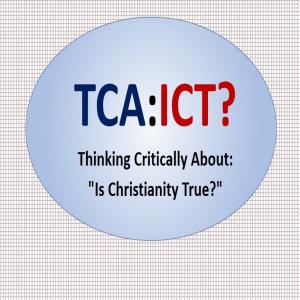
Episodes

Saturday Dec 31, 2022
ANALYSIS OF OBJECTIONS AGAINST THE HALLUCINATION THEORY (DRAFT)
Saturday Dec 31, 2022
Saturday Dec 31, 2022
In their Handbook of Christian Apologetics (hereafter: HCA) the Christian philosophers Peter Kreeft and Ronald Tacelli claim to prove the resurrection of Jesus.
Their argument can be summarized briefly:
- There are only four possible skeptical theories about the alleged resurrection of Jesus: Swoon, Hallucination, Conspiracy, and Myth.
THEREFORE:
- IF Kreeft and Tacelli have refuted those four skeptical theories, THEN the Christian view about this is true (i.e. God raised Jesus from the dead).
- Kreeft and Tacelli have refuted all four skeptical theories (in Chapter 8 of HCA).
THEREFORE:
- The Christian view about this is true (i.e. God raised Jesus from the dead).
I am working on a book (called Thinking Critically about the Resurrection of Jesus) where I will show that Kreeft and Tacelli have failed to refute ANY of the four skeptical theories and that there are MANY other skeptical theories that they have failed to address. So, the key premise (1) is FALSE, the key premise (2) is FALSE, and the key premise (3) is also FALSE. Thus, I will argue that their case for the resurrection of Jesus is a complete and utter failure because it is based on premises that are all FALSE.
To think critically about any important issue requires that one put in some significant time and effort thinking about the issue. Critical thinking is fundamentally CAREFUL thinking, as opposed to SLOPPY and CARELESS thinking. Critical thinking occurs when a person makes a serious effort to conform his or her thinking to the universal standards of thinking (e.g. clarity, accuracy, relevance, significance, logicalness, depth/complexity, breadth/various points of view, sufficiency of evidence, fairness, and objectivity). It takes time and effort to think carefully, to work at thinking that conforms to the standards of thinking.
Argument evaluation is the heart and soul of critical thinking. If someone does not have the skill, ability, knowledge, or desire to carefully evaluate arguments, then that person is NOT a critical thinker. To do argument evaluation well, to do it carefully, one must first have a clear understanding of the argument that one is attempting to evaluate. In other words, argument analysis is essential to argument evaluation. If someone does not have the skill, ability, knowledge, or desire to carefully analyze and clarify arguments, then that person is NOT a critical thinker. However, careful argument analysis requires significant intellectual effort and time, so most people are not interested in careful argument analysis.
Reading careful argument analysis is like watching the sausage get made. So, I plan to put my analysis of the objections of Kreeft and Tacelli against skeptical theories in an Appendix at the back of my book, allowing readers who are more serious about critical thinking to watch the sausage get made, and to learn how to make sausage for themselves, or to improve their skill, ability, and knowledge of argument analysis.
If you are interested in thinking critically about the resurrection of Jesus, and about the Hallucination Theory, then you will benefit by reading and considering the PDF below in which I analyze and clarify all fourteen of the objections that Kreeft and Tacelli raise against the Hallucination Theory.
Version: 20241125

No comments yet. Be the first to say something!